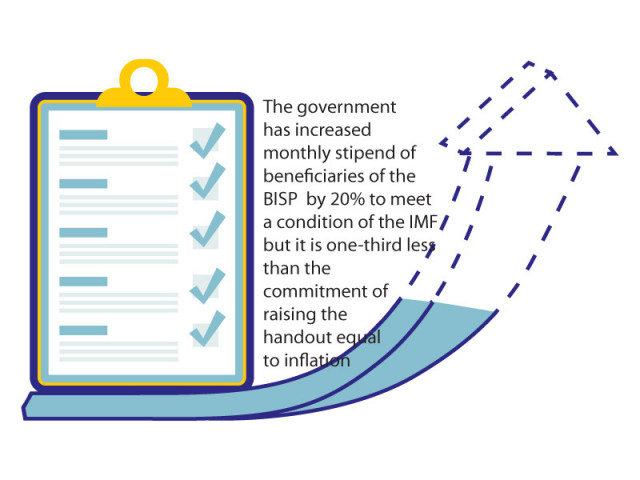BISP stipend raised by 20%
Govt increases financial support for poor in line with commitment to IMF

The government has increased the monthly stipend of beneficiaries of the Benazir Income Support Programme (BISP) by 20% to meet a condition of the International Monetary Fund (IMF), falling short of the commitment to raise the amount equal to the inflation rate.
The BISP Secretariat has notified the increase in the monthly cash stipend from Rs2,916 per family to Rs3,500 with effect from January 1, 2024. There is an increase of Rs583.3 per family, or 20%.
The government has also increased the conditional cash transfer to families on account of health and education cost by Rs167 per month. Not all families receive the conditional cash transfer.
The 20% increase in the unconditional cash grant was Rs831, or nearly 33%, less than the required rise in the stipend.
Under a $3 billion standby arrangement with the IMF, Pakistan was supposed to announce an increase in the monthly stipend equal to the inflation rate with effect from January 1.
Average national inflation in the last fiscal year remained at 29.2% and it was 32.6% in the rural areas. December’s inflation reading came in at 29.7%.
The government had committed to the IMF during first review talks that “the generosity of the BISP unconditional cash transfer will be protected”.
The IMF staff-level report further stated that the government had told the global lender that the BISP remained its prime programme to provide public support to the most vulnerable people.
The IMF underlined that the unconditional cash transfer programme’s current generosity level – 11.7% of the bottom two income quintiles’ monthly consumption – was expected to remain below the global best practice standard of 25% even after the January inflation adjustment. However, the government has given even below the increase in inflation rate.
The programme condition was that “the planned inflation adjustment of the Kafaalat (unconditional) stipend in January 2024 will protect the scheme’s current real generosity level”.
Pakistan has also promised to add another 300,000 families to the BISP programme, bringing enrollment to 9.3 million families. By the end of September, the government had increased the number to 9.2 million families.
Read BISP disburses Rs63b to over 7m families
The conditional cash transfers are also helping to encourage parents to send their children to schools. Before the start of the conditional payments, about 70% children of the poorest families were out of school. This ratio has significantly improved but still about 25% to 30% children are not going to school.
Similarly, now health and nutrition-related conditional grants are also providing additional cash transfers to these families.
For the current fiscal year, the government had allocated a Rs472 billion budget for the BISP, which the IMF welcomed as it was still higher in nominal terms. Out of the Rs472 billion, an amount of Rs361.5 billion was allocated for the unconditional cash transfer.
Pakistan’s poorest households have been hit the hardest by the continued wave of inflation. The interim government has massively increased gas and electricity prices.
The gas price increase for the lowest income group earning a little over Rs17,000 per month is a staggering 1,108%, according to the Pakistan Bureau of Statistics (PBS).
The cost of food items has also skyrocketed in recent months. The Sensitive Price Indicator, covering essential goods mostly used by the lower and middle-income groups, rose 43.8% as of this week, the PBS reported on Friday.
Gas charges for the poorest people increased over 1,108%. Tomato prices surged 133%, chilli prices rose 81%, wheat flour 62%, sugar 58%, garlic 55%, eggs 47% and rice 44%.
Despite the surge in prices, the caretaker government has proposed to the IMF that it can slap a federal excise duty of Rs5 per kg on sugar, in case the FBR’s revenue collection falls short of the target. It has also agreed to further increase gas prices before February 15, according to the IMF report.
The stipend of Rs3,500 per month, or Rs42,000 per annum, is helping these people to sustain some of the additional burden. However, the BISP programme lacks an exit strategy for the people who over the years have been given cash handouts instead of getting help to set up small businesses. The government has committed to the IMF that it will disburse Rs185.5 billion among the BISP beneficiaries during the first half of the current fiscal year.
Published in The Express Tribune, January 28th, 2024.
Like Business on Facebook, follow @TribuneBiz on Twitter to stay informed and join in the conversation.



















COMMENTS
Comments are moderated and generally will be posted if they are on-topic and not abusive.
For more information, please see our Comments FAQ